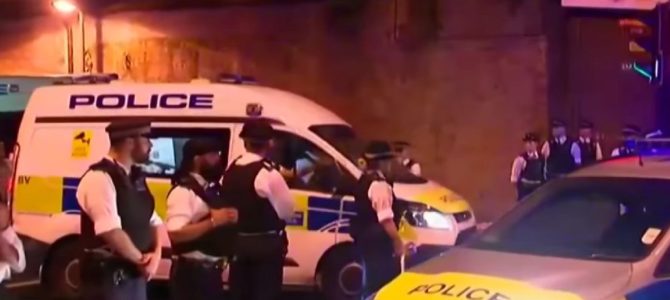
Late Sunday night, a van veered into a crowd of people in London, sending nine to the hospital. One man has died, although it’s unclear whether his injuries were a result of the incident. British authorities are calling it a terror attack.
But what makes this attack different than the London Bridge attack two weeks ago, the Manchester bombing in May, or the Westminster Bridge attack earlier this year, is that rather than being perpetrated by a Muslim man who had pledged his allegiance to ISIS, it was targeting Muslims.
The attack took place at about midnight on Sunday night, just as worshipers were exiting a mosque in Finsbury Park after a special Ramadan service. There are reports that the driver, Darren Osborne, a 47-year-old-man from Cardiff who was arrested, made anti-Islamic remarks while trying unsuccessfully to flee the scene.
Of course, we don’t know the attacker’s reasons for attacking this specific mosque, but it’s interesting to note that the Finsbury Park Mosque, was once, as The New York Times puts it, “a hotbed of Islamist militants,” although it purportedly reconstituted itself 12 years ago and has a “new ethos,” according to the mosque’s website. It seems likely that Osborne chose this mosque intentionally, although we won’t know for sure until he has been interviewed and more information is released.
When People Think Government Is Failing to Protect Them
What we do know is that Osborne perversely adopted a tactic that the Islamic State recommends to would-be jihadists—plowing into a crowd with a large vehicle—which capitalizes on minimum planning and produces maximum damage. This was the same tactic used in the London and Westminster Bridge attacks, and the same as was used last year in Nice, when a Tunisian man drove a truck into revelers at a Bastille Day celebration, taking the lives of 86 people.
This new kind of terror is an ominous sign for Britain, where the government has proven itself unable to prevent terror attacks after it emerged that the perpetrators involved in the attacks on the concert in Manchester and the London Bridge were already known to British police. Britons are understandably feeling frustrated and don’t believe their government can keep them safe.
With the spike in recent terrorist attacks in Britain and the ever-present politically correct rhetoric from Western leaders that accompanies them, there’s a sense in which something like this was inevitable. The frustration, fear, and anger finally boiled over into one man’s decision to target random and innocent Muslims. Osborne is reported to have said “I did my bit” after bystanders tackled him to the ground.
Sunday night’s attack targeting Muslims comes not only after a spike in terror attacks, but also amid a backdrop of British authorities looking the other way when Muslims commit crimes. That’s exactly what happened with the much-reported Rotherham scandal in 2014, in which men of Pakistani origin ran a child sex ring involving approximately 1,400 girls. British police refused to take action out of fear of appearing racist. Despite widespread coverage and condemnation, last year it came out that the problem was ongoing.
This kind of hyper-sensitivity toward the Muslim community in Britain, and a sense, real or not, among many non-Muslims that there are no consequences for wrong-doing in that community, has left many feeling resentful and impotent.
Resentment Rarely Ends Well
Muslim leaders have long expressed concerns that reporting on terror attacks perpetrated by Muslims and calling out radical Islamist ideology would result in Islamaphobic attacks. But it’s unclear what, exactly, those leaders would have suggested as an alternative. Would it have been better if no one mentioned the motives of attackers who had pledged allegiance to Islamic State?
Probably not. That’s because it’s exactly that kind of censorship and equivocation that has contributed to the anger and resentment many feel in the wake of every new ISIS attack.
Just to be absolutely clear, there is no excuse for what this man did, nor is it the fault of Muslim or Western leaders. Osborne alone is responsible for his unconscionable actions. But in order to prevent future attacks of this nature, and to prevent Britain’s security situation from spiraling out of control, it’s crucial that we understand the environment that contributed to this event.
It’s also important, as we move forward and as we condemn this monstrous act, that we also understand the differences between this and the previous attacks in London. Several news organizations, in reporting this story, have referred to it as the latest in a string of terror attacks in the country, and it is. But it’s an attack of a very different sort that bears noting, and it portends something wholly new.
Although more attacks against British Muslims may come, there’s little evidence so far to suggest any kind of organized group, unified belief system, or ideology motivates any such attacks, present or future. That’s a significant difference that affects both the nature of the threat and how the British police will investigate this and any future attacks.
What the mosque attack does suggest is that Britain is at a dangerous boiling point and that the violence is now coming from both sides of the spectrum. If British authorities can’t prove that they are capable of handling the ongoing threat from ISIS among Britain’s own Muslim citizens—and given the flood of British ISIS fighters returning home, it’s unlikely they’ll be able to—we can expect more of these “counter-attacks” on British Muslims. And that’s the last thing Britain needs right now.









